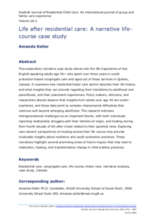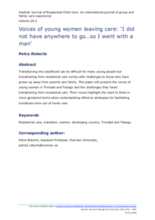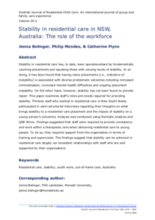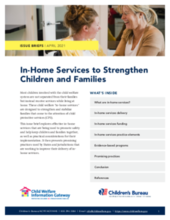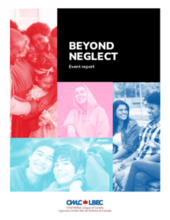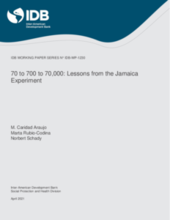Displaying 2581 - 2590 of 14348
This exploratory narrative case study delves into the life trajectories of two English-speaking adults age 50+ who spent over three years in youth protection-based congregate care and aged out of these services in Quebec, Canada.
With millions of children worldwide living in alternative care settings, this article applies the learning from implementation science to advance the sector’s thinking around what needs to be in place to ensure consistently high-quality residential care.
Transitioning into adulthood can be difficult for many young people but transitioning from residential care comes with challenges to those who have grown up away from parents and family. This paper presents the voices of young women in Trinidad and Tobago and the challenges they faced transitioning from residential care. Their voices highlight the need to think in more gendered terms when contemplating effective strategies for facilitating transitions from out of home care.
Stability in residential care has, to date, been operationalised by fundamentally counting placements and equating these with varying levels of stability. In so doing, it has been found that having many placements (i.e., indicative of instability) is associated with diverse problematic outcomes including increased criminalisation, increased mental health difficulties and ongoing placement instability. On the other hand, however, stability has not been found to provide repair. This paper examines staff’s roles and needs required for providing stability.
Most children involved with the child welfare system are not separated from their families but instead receive services while living at home. This issue brief explores effective in-home services that are being used to promote safety and help keep children and families together, as well as practical considerations for their implementation. It then presents promising practices used by States and jurisdictions that are working to improve their delivery of in-home services.
In April 2021, the Child Welfare League of Canada (CWLC), in partnership with the Children’s Aid Foundation of Canada, led a series of cross-sectoral convenings with the goal of introducing a positive obligation for government and service providers to assist families who are experiencing difficulties in a context of poverty. This three-day event convened people across sectors to gain a better understanding of how the child welfare system responds to the conditions that place families at an increased risk of child protection involvement due to assessments of ‘neglect’. The goal of Beyond Neglect is to develop and champion evidence-based legislative frameworks that could help service providers and governments to better meet the needs of children, youth and their families.
This document compares three versions of the same home visiting model, aimed at improving parent-child interactions and child development: the well-known Jamaica model, which was gradually scaled up from an efficacy trial (‘proof of concept’) in Jamaica, to a pilot in Colombia, to an at-scale program in Peru.
This report maps current practice in philanthropic support for child- and youth-led work at the community level and offers strategic advice to donors on how to strengthen their funding modalities to achieve greater impact.
The goal of the Reconstructing Children’s Rights Institute is to raise awareness and recognition of how racism, patriarchy, and power permeate the international child rights and child protection field. This first conversation examines the larger ecosystems of international development, humanitarian aid, international relations, and peace and security, and unpacks the colonial vestiges and power imbalances intrinsic to these larger contexts.
This study explores the effect of COVID-19 on a small number of privately run and funded residential care institutions by conducting a qualitative research study comprising 21 semi-structured interviews across seven focus countries.

